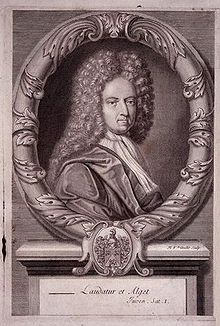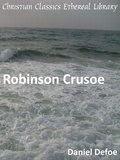Daniel Defoe
English writer and journalist
Biography
Daniel Defoe was born in London in 1660, the son of a butcher named James Foe. He changed his name when he became a writer circa 1695, although it was by no means his only pseudonym. Others included "Eye Witness", "Andrew Morton, Merchant", and amusingly, "Heliostropolis, secretary to the emperor of the Moon". Initially, Defoe spent time at Morton's academy for Dissenters but following certain travels on the continent that took in France and Spain, he settled down as a hosiery merchant in Cornhill and married Mary Tuffley. Defoe took part in Monmouth's rebellion and it was whilst in hiding after the Duke of Monmouth's execution that he noticed the name "Robinson Crusoe" in a churchyard, carved on a stone. He recalled the name and it became the title of his most famous hero some thirty-four years later. In 1688, Defoe joined the forces of William III.
It was not until the late 1690s, however, that his first important work began to appear, with An Essay upon Projects (1697) and the extremely popular satirical poem The True-Born Englishman (1701). Defoe's ironic pamphlet The Shortest Way with Dissenters (1702) demanded the total suppression of dissent - he himself was a Dissenter - and got him imprisoned. This unfortunate circumstance turned out to be a triumph for the writer, however. While he stood in the pillory for three days, the crowd bought copies of and then chanted his "Hymn to the Pillory", a mock-Pindaric ode, that he had written in prison. A Tory politician, Harley, managed to get Defoe a pardon and gave him new employment as a secret agent, which he held between 1703 and 1714. Defoe wrote numerous pamphlets for Harley and also began A Weekly Review of the Affairs of France (later A Review of the State of the British Nation). Defoe wrote this paper three times weekly and almost entirely on his own, providing not only political discussion but lighter pieces on love and gambling for example. He was imprisoned again, briefly, for anti-Jacobite pamphlets in the early 1710s and was convicted of libeling Lord Annesley in 1715.
It was in his later years, however, that Defoe wrote the novels for which he is now justly famous. They were perhaps the first books that conform to the term "novel", and brought him great success. 1719's Robinson Crusoe and its sequel, the Farther Adventures of Robinson Crusoe, are probably the most famous, but soon he had published Captain Singleton (1720), Moll Flanders (1722), A Journal of the Plague Year (1722) and Roxana (1724). These novels were extremely influential and showed a journalist's interest in realistic description. Many of the works written after Roxana were travel books (e.g. A New Voyage round the World (1724) and A Tour through the Whole Island of Great Britain (1724-6)). Defoe's simple but effective prose style ensured him widespread popularity and he is seen as the father of the English Novel, as well as the first journalist of great individual merit. He died in his lodgings in 1731.

